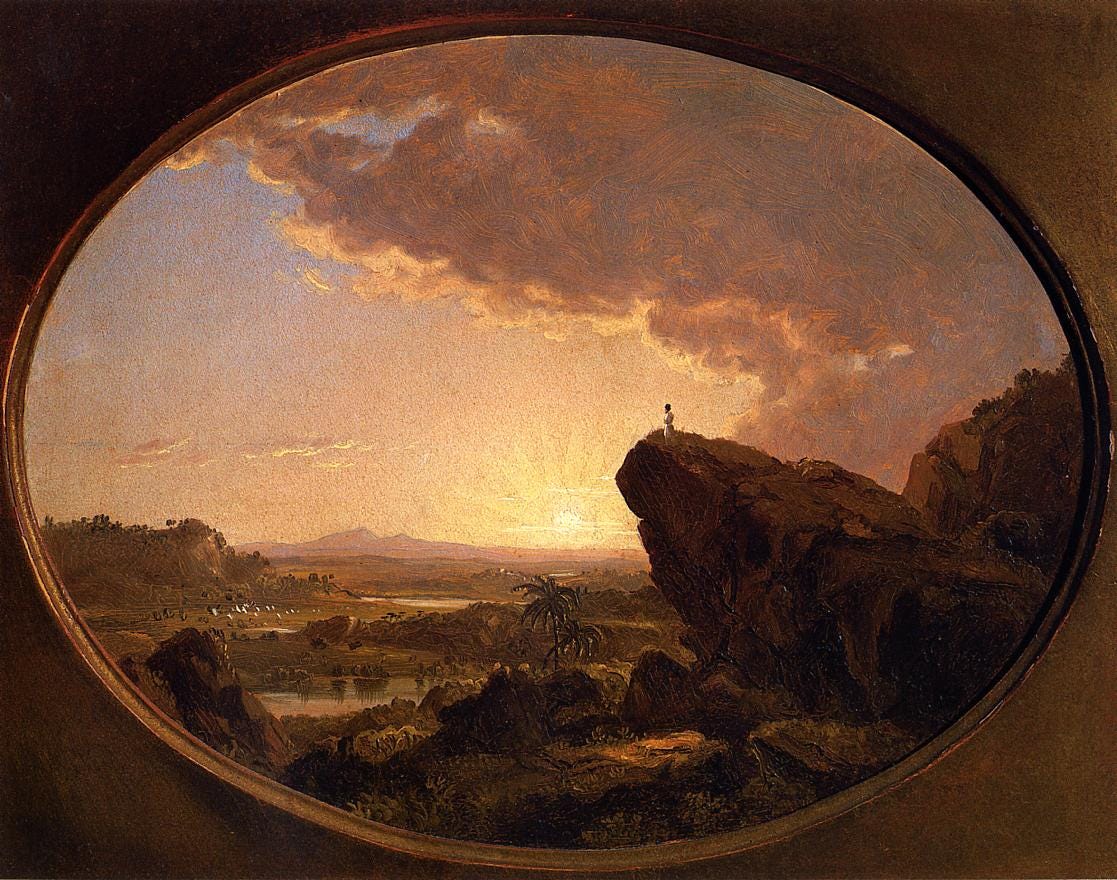I have been putting the finishing touches on a book-length poem made up of 144 poems, called The Twelve-Gated City, after the heavenly Jerusalem that John saw in a vision, in Revelation. Our excerpt today comes from the end of the first of 33 dramatic monologues or dialogues. This one, as I’ve imagined it, is spoken by Moses, a very old man, on the top of Mount Pisgah, just before his death. You may remember that the Lord punished Moses for his doubtfulness, when the prophet struck the rock not once but twice, and there came forth a spring of water for the thirsty people. What would Moses think about, as he sat on that mountain and watched the people below, in their cheer and celebration? What would his final instruction to Joshua — Yehoshua — be?
Deuteronomy 34: 1-4 And Moses went up from the plains of Moab unto the mountain of Nebo, to the top of Pisgah, that is over against Jericho. And the Lord shewed him all the land of Gilead, unto Dan, And all Naphtali, and the land of Ephraim, and Manasseh, and all the land of Judah, unto the utmost sea, And the south, and the plain of the valley of Jericho, the city of palm trees, unto Zoar. And the Lord said unto him, This is the land which I sware unto Abraham, unto Isaac, and unto Jacob, saying, I will give it unto thy seed: I have caused thee to see it with thine eyes, but thou shalt not go over thither.
I often think that if we could understand the first two commandments (or three, depending on how you number them) that the Lord gave to Moses, we would understand everything about how we must be as the people of God, and we would gain a wisdom that could make sense of all the world and our place in it. It’s not that Moses himself says he understands it. He doesn’t — how could he? Only with Christ can we see the Father. But he begs the first “Jesus,” that is, Joshua, to keep those commandments regardless of whether he or anybody yet can understand why. And with pagans all around, it might be very hard for an ordinary son of Israel to understand why other people should abound in gods, but the chosen people should acknowledge only One.
My gentle brother Aaron is no more. He liked the people well, but loved them less; No more my envious Miriam and her songs. The hour draws near. I have a thing to say, Yehoshua, but I stammer, and the sun Is sloping to its den, when you must go. The rabble of gods in Canaan all have names And faces, such as men with clever hands – Like our Aholiab and Bezaleel – Might whittle from a stump of wood, or stone, To be familiar on the mantel-piece, An ally, or a bargainer in bad times. But when I asked, “Who shall I say has sent me?”, He from the fire who called Himself the God Of all our fathers, God of Abraham, Isaac, and Jacob, God of seed and flesh, Sounded the Name above all other names Because it is none, nor may it be uttered. Promise, Yehoshua – by that holiest flame That purges as it burns, by that dread earth I dared not set my foot upon – swear, swear To the old man you shall not see again, You will keep those commandments traced in stone By the invisible finger of our God, Even those impossible to understand, Never to own a neighborhood of gods, Never to hold Him captive in a face, Never to smudge and smear the holy Name As if it were a shekel in your bag – Three several laws, but one, as He is one. Somehow, I could not tell you if I knew, On these bewildering ordinances depend Earth and the heavens and all the hosts therein. Let Israel not grow old in her conceit! Let not the river of obedience sink Into the sands of slavery and self-will. Go now, my good lad. I am not alone, And if you see a misting in my eyes, Think I am standing on a shore at dawn When all the east is silence, life, and fire. More, ever more – I go to seek His face And hearken to the music of His name. One kiss, Yehoshua. Yours is now the time. Go lead our children to the Promised Land.





It is always a great day when we get to read some of your own poetry, Dr. Esolen! This is magnificent, as always. I especially like your choice to render the name of Joshua as it was in the Hebrew, as that cements these thoughts of Moses even more firmly as a prefiguring of the other Yehoshua--the One to come! It is easy to see how Moses' hopes and pleas here are not just proximate hopes for Joshua's leadership of Israel, but also his hope for the future Messiah...a hope which he himself may not even be aware he is expressing. I eagerly look forward to getting my hands on a copy of The Twelve-Gated City, once it is complete!
"Never to smudge and smear the holy Name
As if it were a shekel in your bag –"
Absolutely perfect...Our Culture uses the name of God as a throw-away word and as every part of speech.